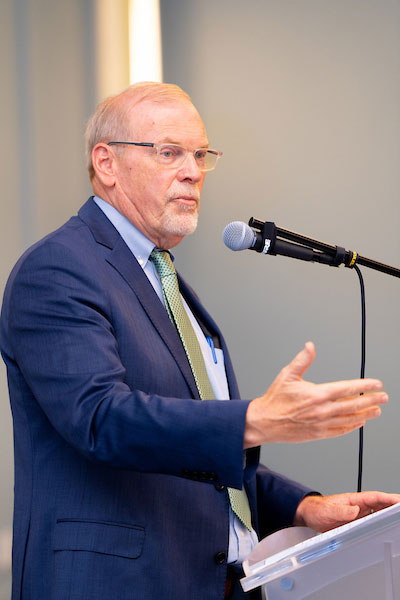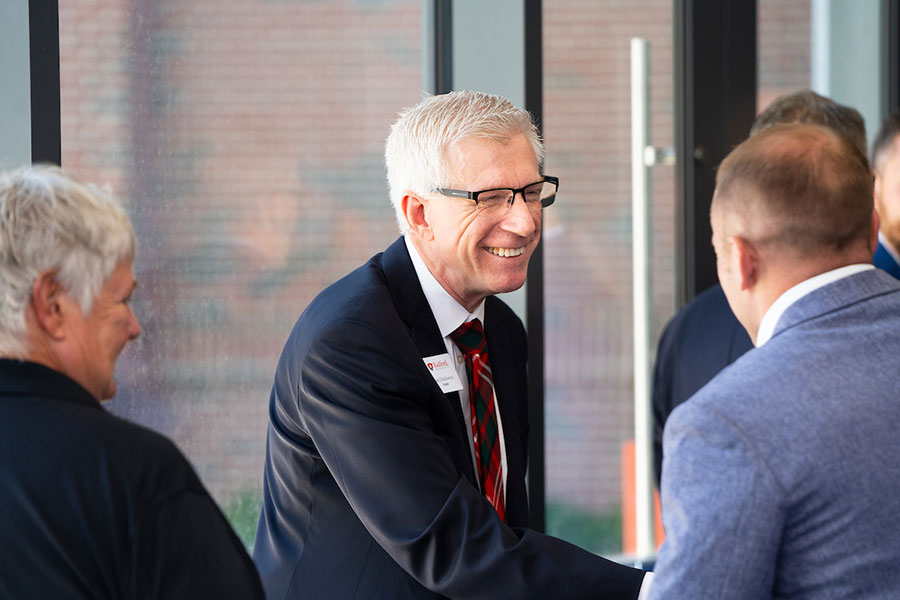Radford University hosted U.S. Rep. Morgan Griffith at a luncheon on June 17, with the congressman speaking at length before an audience of dozens of officials from local government, business, technology, education and economic development.
Griffith, of Salem, Virginia, is the U.S. representative for Virginia’s 9th congressional district, a region that includes the New River Valley and most of rural Southwest Virginia.

His hourlong talk, held at The Highlander Hotel Radford, was attended by about 70 guests, including area political leaders, university officials, local executives, advocates and others.
The congressman took a particularly decisive stance regarding the rapidly expanding profile of artificial intelligence, or A.I.
“A.I. is already doing amazing things. Some of it is scary … A.I. is getting to be so good, they can fake everybody’s voice, their image … it’s amazing what it can do,” Griffith noted, addressing generative A.I.’s capacity – among its considerable processing abilities – to mimic and reinterpret video and audio footage.
“But it also can move technology, fast,” Griffith added. “The only way we're moving the economy forward and remaining number one, is we have to go ahead and recognize [A.I.] is the way of the future, and either we join or we fall back. I choose to join.”
The congressman also argued that he felt the immense power demands required by A.I. advances could most immediately be served by fossil fuels, gas or nuclear sources.
“We're working on data centers across Southwest Virginia, but they're all going to need power; you're going to need power plants … and it's got to be cleaner-burning coal, cleaner-burning natural gas or nuclear,” Griffith maintained. “You cannot use wind and solar under today's constraints.”

The June 17 chat also coincided with a period of considerable uncertainty, both globally and nationally – the escalating conflict between Israel and Iran remains ongoing; such factors as federal funding reductions, immigration changes and the economic effects of the president’s tariff plans continue to unfold; and, most directly, the federal budget reconciliation bill (commonly referred to as “The One Big Beautiful Bill Act”) now stands before a Senate vote, leaving its full implications in flux.
“We'll try to sort that out as we move forward,” Griffith said, acknowledging the elements that are still in play. “Somebody may want to ask me… ‘What's going on?’ And the short answer is, ‘Who knows,’” although he did estimate an outcome on the bill would likely arrive sometime between mid-July and September.
Other points he addressed regarded federal initiatives, including $1.9 million earmarked for a pedestrian trestle that would span the New River between Radford and Pulaski County; the prospect of Brownfield pre-certification for former industrial sites; and the importance of maintaining a strong healthcare system in the face of potential changes to Medicaid.

Griffith was introduced at the top of the luncheon by President Bret Danilowicz, who told the audience of community leaders: “It gives me heart to see this group coming together because we all care about the New River Valley … and how we pull together to make this economy work well. As a university, we know that we cannot make progress alone.”
That said, Danilowicz also cited the school’s complement of 8,000 students and 500 faculty members standing behind the university’s current economic development push.
“That spirit of partnership defines Radford University, and it’s why we’re proud to celebrate our success with local, state and federal officials because these individuals share our vision for mutual progress.”